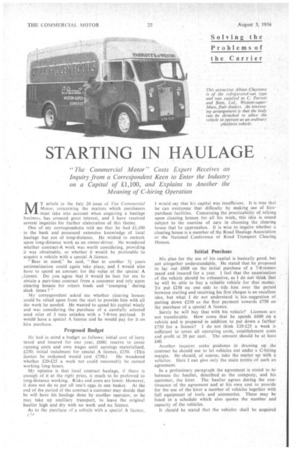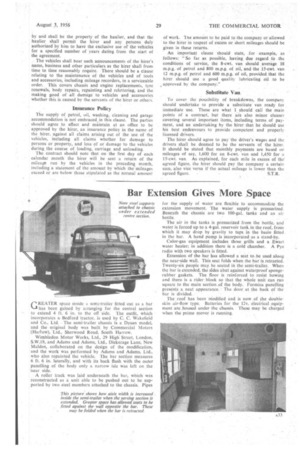STARTING IN HAULAGE
Page 62

Page 67

If you've noticed an error in this article please click here to report it so we can fix it.
1VIY article in the July 20. issue or The Commercial Motor, concerning the matters which purchasers must take into account when acquiring a haulage business, has aroused great interest, and I have received several inquiries for further elaboration of this theme.
One of my correspondents told me that he had £1,100 in the bank and possessed extensive knowledge of local haulage but not of long-distance. He wished to embark upon long-distance work as an owner-driver. He wondered whether contract-A work was worth considering, providing it was obtainable, or whether it would be preferable to acquire a vehicle with a special A licence.
" Bear in mind," he said, "that in another 3+ years nationalization could again take place; and I would also have to spend an amount for the value of the special A .licence. Do you agree that it would be best for me to obtain a part-time contract from a customer and rely upon clearing houses for return loads and ' tramping' during slack times ? "
My correspondent asked .me whether clearing houses could be relied upon from the start to provide him with all the work he needed. He wanted to spend his capital wisely and was considering the purchase of a carefully selected used oiler of 3 tons unladen with a 7-8-ton payload. It would have a special A licence and he would pay for it on hire purchase.
Proposed Budget
He had in mind a budget as follows: initial cost of lorry taxed and insured for one year, £600; reserve to cover running costs and own wages until earnings materialized, £250; initial instalment for special A licence, £250. (This licence he reckoned would cost £750.) He wondered whether £20-£25 a week net could reasonably be earned working long hours.
My opinion is that local contract haulage, if there is enough of it at the right price, is much to be preferred to long-distance working. Risks and costs are lower. However, it does not do to put all one's eggs in one basket. At the end of the period of the contract a customer may decide that he will have his haulage done by another operator, or he may take up ancillary transport, to leave the original haulier high and dry with no work and no licence.
As to the purchase of a vehicle with a special A licence,
I would say that his capital was insufficient. It is true that he can overcome that difficulty by making use of hirepurchase facilities. Concerning the practicability of relying upon clearing houses for all his work, this idea is sound subject to the exercise of care in choosing the clearing house that he approaches. It is wise to inquire whether a clearing house is a member of the Road Haulage Association or the National Conference of Road Transport Clearing Houses.
Initial Purchase His plan for the use of his capital is basically good, but not altogether understandable. He stated that he proposed to lay out £600 on the initial purchase of a 7-8-tanner taxed and insured for a year. I feel that the examination . of the vehicle should be exhaustive, as I do not think that he will be able to buy a reliable vehicle for that money. To put £250 on one side to tide him over the period between starting and receiving his first cheque is an excellent idea. but what I do not understand is his. suggestion of putting down £250 as the first payment towards £750 on the purchase of a special A licence.
Surely he will buy that with his vehicle? Licences are not transferable. How come that he spends £600 on a vehicle and is prepared in addition to put down a further 1750 for a licence? I do not think £20-£25 a week is sufficient to cover all operating costs, establishment costs and profit at 20 per cent. The amount should be at least £40.
Another inquirer, seeks guidance in drawing up the contract he should use to let vehicles out under a C-hiring margin. He-should, of course, take the matter up with a solicitor. Here I can give only the main points of such an agreement.
In a preliminary paragraph the agreement is stated to be between the haulier, described as the company, and his customer, the hirer. The haulier agrees during the continuance of the agreement and at his own cost to provide for the use of the hirer a number of vehicles together with full equipment of tools and accessories. These may be listed in a schedule which also quotes the number and capacity of the vehicles.
It should be stated that the vehicles shall be acquired
by and shall be the property of the haulier, and that the haulier shall permit the hirer and any persons duly authorized by him to have the exclusive use of the vehicles for a specified number of years dating from the start of the agreement.
The vehicles shall bear such announcements of the hirer's name, business and other particulars as the hirer shall from time to time reasonably require. There should be a clause relating to the maintenance of the vehicles and of tools and accessories, including mileage recorders, in a serviceable order. This covers chassis and engine replacements, tyre • renewals, body repairs, repainting and relettering, and the making good of all damage to vehicles and accessories whether this is caused by the servants of the hirer or others.
Insurance Policy The supply of petrol, oil, washing, cleaning and garage accommodation is not embraced.in this clause. The parties should agree to effect and maintain at an office to be approved by the hirer, an insurance policy in the name of the hirer. against all claims arising out of the use of the vehicles, including all claims whether for damage to persons or property, and loss of or damage to the vehicles during the course of loading, carriage and unloading.
The contract should note that on the first day of each calendar month the hirer will be sent a return of the mileage run by the vehicles in the preceding month, including a statement of the amount by which the mileages exceed or are below those stipulated as the normal amount of work. The amount to be paid to the company or allowed to the hirer in respect of excess or short mileages should be given in these returns.
An important clause should state, for example, as follows: "So far as possible, having due regard to the conditions of service, the 8-cwt. van should average 18 m.p.g. of petrol and 800 m.p.g. of oil, and the 15-cwt. van 12 m.p.g. of petrol and 600 m.p.g. of oil, provided that the hirer should use a good quality lubricating oil to be approved by the company."
Substitute Van
To cover the possibility of breakdowns, the compan3 should undertake to provide a substitute van ready for immediate use. These are what I should call the main points of a contract, but there are also minor clauses covering several important items, including terms of payment, and an undertaking by the hirer that he should use his best endeavours to provide competent and properly licensed drivers.
The hirer should agree to pay the driver's wages and the drivers shall be deemed to be the servants of the hirer. It should be stated that monthly payments are based or. mileages of say, 1,600 for an 8-cwt. van and 1,450 for a 15-cwt. van. As explained, for each mile in excess of the agreed figure, the hirer should pay the company a certain sum, also vice versa if the actual mileage is lower than the agreed figure. • S.T.R.




































































































